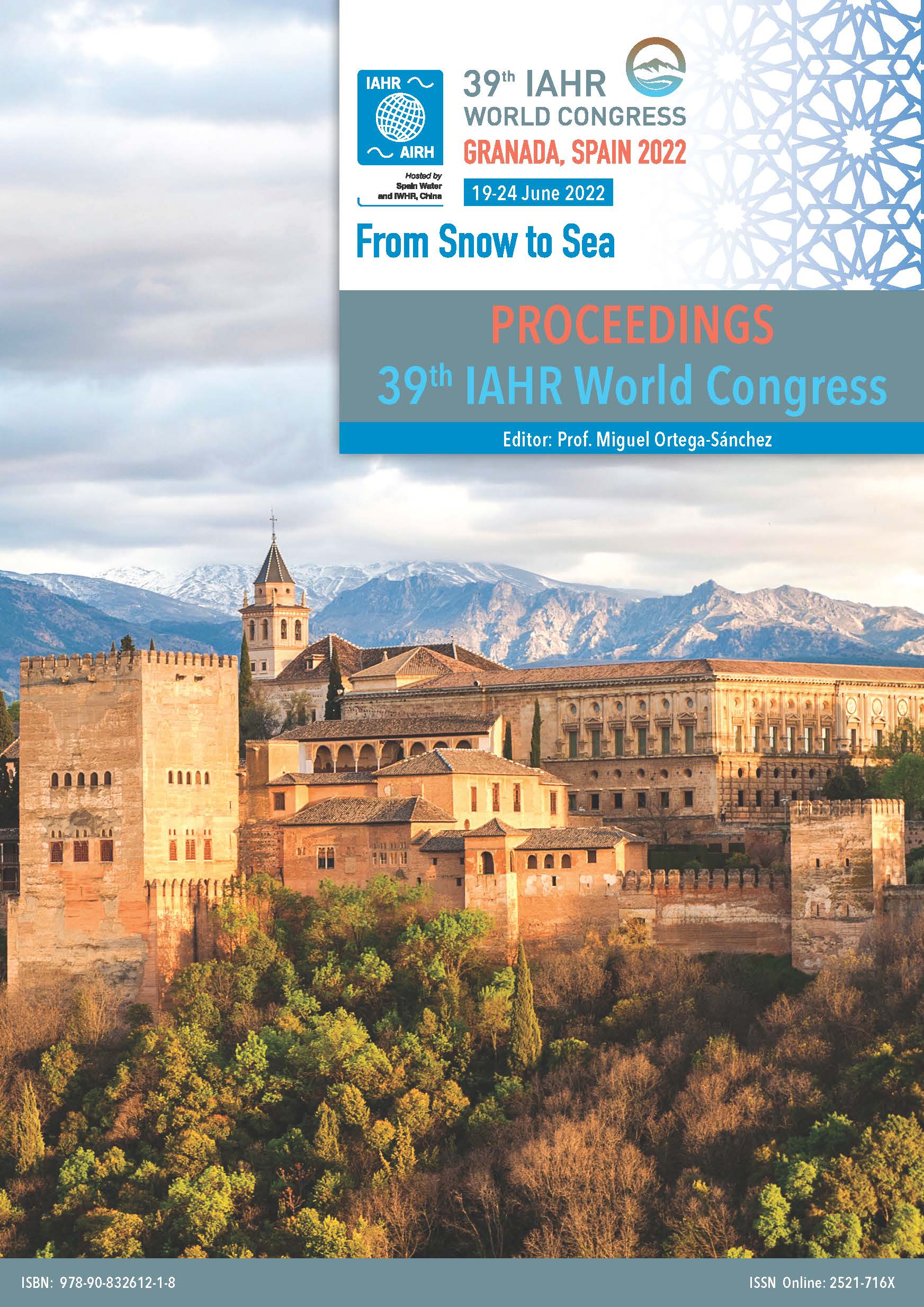IAHR Document Library

Proceedings of the 39th IAHR World Congress (Granada, 2022)
- ISSN Online: 2521-716X
- ISSN Print: 2521-7119
- ISBN: 978-90-832612-1-8
- Publisher: International Association for Hydro-Environment Engineering and Research (IAHR)
- Editor(s): Prof. Miguel Ortega-Sánchez, University of Granada, Spain
- Related: 39th IAHR World Congress
Innovative approaches to water management challenges are needed more than ever to ensure sustainable and resilient societies worldwide. Under the overall theme "From Snow to Sea", the 39th IAHR World Congress focused on the importance of an integrated and intelligent approach to managing the whole water cycle to address the global challenges people and the environment face. The Congress highlighted IAHR's commitment to the critical role that sound understanding of the water cycle plays in achieving the Sustainable Development Goals (SDGs) and Agenda 2030.
Revision process
The papers included in this volume were part of the 39th IAHR World Congress which took place in Granada, Spain, from 19 to 24 June 2022. Papers were selected and subjected to review by the Editor and the International Scientific Committee and followed a revision process with the following steps: (1) The committees involved in the organisation of the Congress established a set of technical criteria for the committee in charge of the revision. (2) Submitted papers were sent to one or two experts in the field. (3) Authors were asked to include the necessary amendments and follow the reviewers´ comments, and (4) Their work was reviewed until the final version was approved by the Editor.
Ethical guidelines and Code of Conduct
In addition to the technical criteria, IAHR publications follow the Ethical Guidelines and Code of Conduct provided by the Committee of Publication Ethics (COPE). A Publication Ethics and a Publication Malpractice statement are publicly available throughout the entire review process.
Besides the peer-reviewed papers, this volume contains the reports of the High-Level Panels.
The 39th IAHR World Congress proceedings are long-term preserved following the IAHR Policy of digital preservation archives.
Committees
The International Scientific Committee (ISC) and the Advisory Board provide counsel and support to the Congress Organising Group (COG) for the scientific and technical coordination of the congress.
Content
Theme 1: Human-water relationships (42)
Theme 2: Snow, river and sediment management (132)
Theme 3: Environmental hydraulics and urban water cycle (129)
Theme 4: Hydraulic structures (108)
Theme 5: Water resources management, valuing and resilience (109)
Theme 6: Computational and experimental methods (256)
Theme 7: Coasts, estuaries, shelves and seas (81)
Theme 8: Extreme events: from droughts to floods (177)
High-level panels reports
From Snow to Sea — Managing Enclosed Seas Under Climate Threat
Water Governance
Artificial Intelligence
Nature-based Solutions and Ecohydraulics
Keynotes
Coastal Resilience in a Changing Climate: the CoastPredict Solution
Water Challenges in Spain
Machine Learning for Scientific Discovery, with Examples in Fluid Mechanics
Special sessions
Reservoir sedimentation in semi-arid and arid environments. A comparative analysis from vulnerability of climate change in sensitive environments
Integrating ecohydraulics and ecohydrology in environmental flow assessments
Environmental hydraulics related to aquaculture
Ecohydraulics 2021: Novel methods to investigate flow-biota interactions numerically, in the lab and in the field
Green infrastructure and sustainable urban drainage systems
Implementing Nature Based Solutions – bringing science to practice
The shallow water model intercomparison session: Benchmarking overland flow simulations
Copyright: @2022 IAHR
| ID | Title | Authors | Year |
|---|---|---|---|
| 21581 | A Comparative Study of Two Flood-Prone Communities Against River Flooding: Berat (ALBANIA) and Sarajevo (BOSNIA) |
Negin Binesh; Giuseppe T. Aronica; Emina Hadzic; Fehad Mujic; Miranda Deda; Laura Rossello; Halim Koxhai; Simone Gabellani; Rocco Masi; Christophe Viavattene; Simon Mccarthy; Giuseppina Brigandi
|
2022 |
| 21582 | A Comparative Assessment of Rheological Laws for Mud Flows |
Filippo Mauro; Alessandro Leonardi; Michele Iervolino; Marina Pirulli
|
2022 |
| 21583 | Assessment of Flood Damages Using Building Footprint Data |
Mustafa Altinakar; Molly Mary Finster; Kyle Burke Pfeiffer; Preston W. Sr. Wilson
|
2022 |
| 21584 | Methodologies and Tools to Cope with Climate Change in Urban Areas: The Resccue Project |
Russo Beniamino; Andrea Paindelli; Angel Villanueva; Montse Martinez
|
2022 |
| 21585 | Scenarios Definition for Extreme Rainfall Events Based on a Combination of Field and Satellite Rainfall Data |
Gogoua Habib Gogoua; Franziska Tugel; Reinhard Hinkelmann
|
2022 |
| 21586 | Development of the Methodology for the Design Hydrograph Estimation in Slovenia, Europe |
Nejc Bezak; Matjaz Mikos; Klaudija Lebar; Mojca Sraj
|
2022 |
| 21587 | Integrated Cost-Benefit Analysis and Prescriptive Decision Tree Model for a Flood Risk Management Problem |
Jacopo Napolitano; Massimo Di Francesco; Giovanni Maria Sechi
|
2022 |
| 21588 | Polder2C’s Living Lab: Toolbox for a Better Future of Levee Management |
Jadon Beerlandt; Pieter Rauwoens; George Anoyatis; Ammar Aljer
|
2022 |
| 21589 | HIDRALERTA System: Validation with Elsa and Fabien Depressions |
Juana Fortes; Liliana Pinheiro; Ana Catarina Zozimo; Joao Alfredo Santos
|
2022 |
| 21590 | On the Effectiveness of Contrasting Typologies of Management Measures in Flood Risk Reduction |
Sergio Salazar-Galan; Felix Frances
|
2022 |